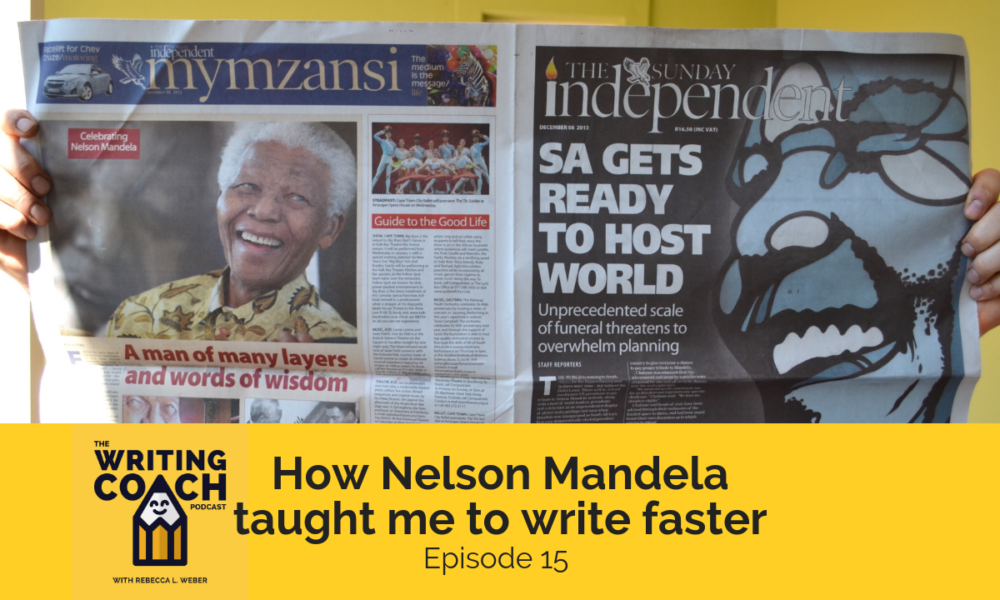The Writing Coach Podcast 15: How Nelson Mandela taught me to write faster

Today’s episode addresses two questions I get asked all the time, but never together:
- How can I write faster?
- What brought you to South Africa?
These are somewhat surprisingly interconnected for me, and today i’m going to share with you one of the lessons Mandela taught me–how to write faster.
Listen to episode 15 of the Writing Coach Podcast:
Subscribe to The Writing Coach Podcast on iTunes, Stitcher, Android, or RSS.
Mentioned on today’s show:
Click here to register for a free class on writing faster.
From my weekly newsletter:
Nelson Mandela was born 100 years ago today. While it’s not a public holiday here in South Africa, across the country people celebrate Mandela Day by volunteering for a community project. #BeTheLegacy
Of anybody I haven’t known in real life, Mandela probably has had the largest influence on me and the course of my life choices, so I thought I’d share a few of the lessons I learned from him.
Technically speaking, I did shake his hand once. It was 1996, right before he cast his ballot in the first local elections. By the way, this was also immediately before my only camera battery died. (Bonus lesson: always have a back-up battery.) As exciting as it was, that flash meeting wasn’t as important as the life lessons he’s given me through his writings, talks, and leadership:
+Take the time to reflect and be true to yourself. When Mandela was a guest on the Oprah show, he spoke to her about this insight:
The first thing is to be honest with yourself. You can never have an impact on society if you have not changed yourself. And one of the most important weapons in changing yourself is to recognized that peace, I mean people everywhere in the world, want peace.
Oprah would visit South Africa for long stretches and spent a lot of time with Madiba. They were quite close, with a deep bond and true friendship.
My understanding was that they truly accepted one another. That might sound kind of strange, as so many of us do accept and love them from afar. I think the distinction here was that they didn’t have expectations of one another the way that many others did.
+Life can be really long. We’re always told that life can be short but that’s a matter of perspective. Some people live minutes or hours. Some people live tens of thousands of days. Madiba actually had quite a long life for a human. If it turns out that you’re getting those extra decades of life what are you going to do with them?
+Social justice is worth fighting for. It does matter what a single person does with their life. Political change can and does happen.
Dismantling the legacy of institutional racism in South Africa, the United States, and elsewhere doesn’t happen in a generation or two. This makes it more urgent, not less.
Being an advocate for equality isn’t limited to the traditional political activists we see. Whatever skills you have, you can use them to look out for your fellow beings here on planet Earth.
+Stay the path. It’s so common these days to be too overwhelmed to make choices or to stick with them, and not make real progress as a result. Mandela made huge personal sacrifices, but also had total piece of mind knowing that he’d stayed true to himself and the cause.
+Write things down. Nelson Mandela’s autobiography, Long Walk to Freedom, is, well, pretty long. I wonder if it would be published today in the same way or if his editor would have had a heavier hand, making it more accessible (read: shorter). It’s still worth the read if you want to know more of Mandela’s life, and in particular to better get to know the thoroughness of his thinking and his analysis.
+Learn to forgive. Madiba’s magnanimity in forgiving the very people who had imprisoned him for 27 years is why he’s respected not simply by those with similar politics or who saw him as a freedom fighter. I don’t know that there will be another example in our lifetimes of such a powerful modeling of the power of forgiveness and the ability to negotiate and to continue to find common ground with people who have literally sworn to be your enemy.
+Write faster. Okay, this sounds pretty odd, and I’m going to save the details for next time. But in a very direct way, one of the lasting personal lessons Mandela gave me was how to write more quickly, and I’ll share it with you next week.
South Africa’s unfinished business, by Desmond Tutu in the Boston Globe, April 26, 1994
I ain’t gonna play Sun City:
In Cape Town, leaders pay tribute to Mandela, USA Today
Prisons that held Mandela did not crush freedom’s spirit, USA Today
Revisiting Nelson Mandela’s Genadendal, USA Today
Bruce Springsteen and the E Street Band open with the Specials’ “Free Nelson Mandela” in Cape Town:
If you enjoyed this episode of the Writing Coach Podcast, please write a review on iTunes to help other freelance writers find it too. I may give you a shoutout on a future episode.
Listen to previous episodes of the Writing Coach Podcast here.
Not sure what to include in a pitch to an editor? Check out my blueprint for writing queries that editors find irresistible. Click here to download a copy of the free eguide, “5 Proven Steps to Writing Queries that Sell.”

 Download a free copy of “5 Proven Steps to Writing Queries that Sell.” I hate spam and will never share your info.
Download a free copy of “5 Proven Steps to Writing Queries that Sell.” I hate spam and will never share your info.